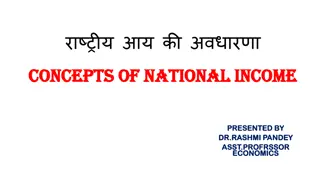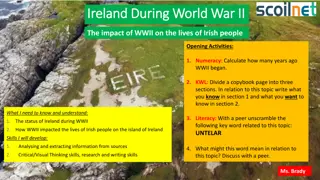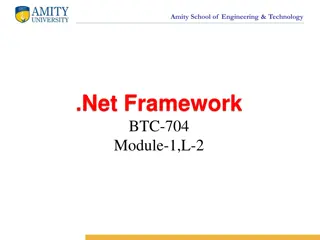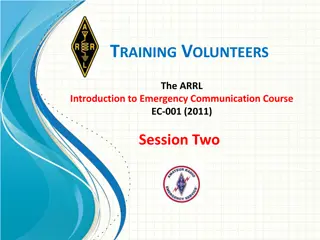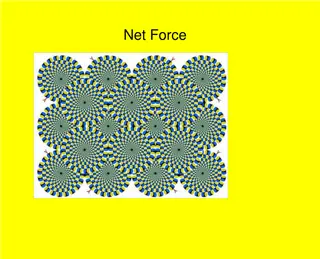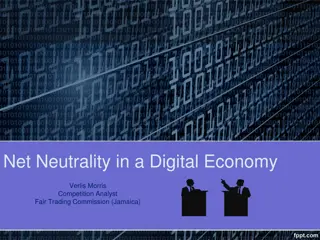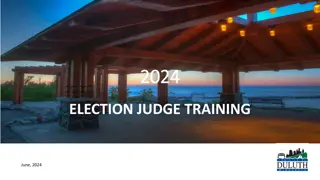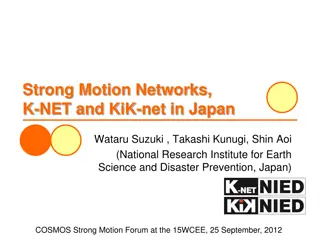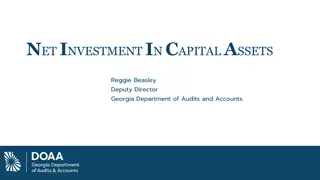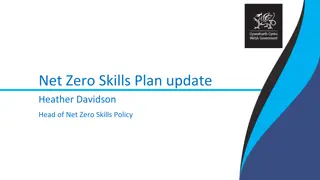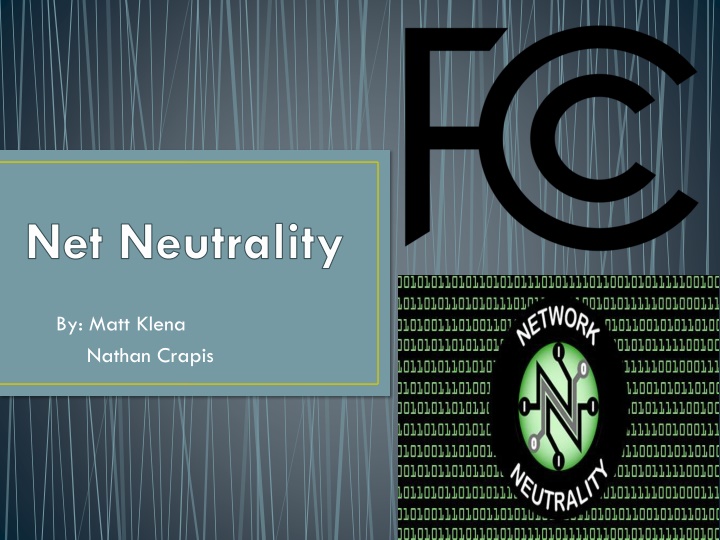
Importance of Net Neutrality
Net neutrality is the principle that Internet service providers should allow access to all content without favoritism or blocking. This concept ensures equal treatment of data on the Internet, preventing fast lanes for a fee and promoting diversity. Stakeholders include ISPs like Comcast and Verizon lobbying for fees, while supporters like Google and Microsoft advocate for an open Internet. The FCC is leading the fight for net neutrality, and the Telecommunications Act of 1996 established protections for the Internet as a non-discriminatory platform.
Uploaded on | 1 Views
Download Presentation

Please find below an Image/Link to download the presentation.
The content on the website is provided AS IS for your information and personal use only. It may not be sold, licensed, or shared on other websites without obtaining consent from the author. If you encounter any issues during the download, it is possible that the publisher has removed the file from their server.
You are allowed to download the files provided on this website for personal or commercial use, subject to the condition that they are used lawfully. All files are the property of their respective owners.
The content on the website is provided AS IS for your information and personal use only. It may not be sold, licensed, or shared on other websites without obtaining consent from the author.
E N D
Presentation Transcript
Net Neutrality By: Matt Klena Nathan Crapis
What is Net Neutrality? The principle that Internet service providers (ISP s) should enable access to all content and applications regardless of the source, and without favoring or blocking particular products or websites. Requires everything going across the internet to be treated equally
Why is Net Neutrality So Important? Without net neutrality, companies like Comcast and Verizon will be allowed to charge websites to reach users quicker. ISP s could slow the Internet down and create fast lanes for a fee which will restrict diversity and content via the Internet New or smaller websites that cannot afford to pay the fee allowing them access to the fast lanes will be at a disadvantage. Could potentially increase the consumer rates for Internet access http://www.nytimes.com/video/technology/100000002881 329/how-net-neutrality-works.html
The Players: The Opposition ISP s like Comcast, Verizon, Time Warner and others have invested billions of dollars in copper, cable and fiber optic lines to provide high-speed Internet. ISP s lobbying for system of fees that splits the Internet into two tiers where access to quicker Internet is only accessible for a price. The ISP s claim charging the fees to these fast lanes is necessary in order to earn a return on their multi-billion dollar investment. The problem is that the Internet we built is getting creaky So the question is, as we build this Internet of the future, who s going to pay for it? Mike McCurry, former Press Secretary for President Clinton and Chairman of Hands Off the Internet, a group opposing net neutrality that is supported by companies such as AT&T and Alcatel
The Players: Net Neutrality Supporters Google, Amazon, Microsoft and hundreds of other companies all agree and believe the Internet should be equal to all Say tiered system is discriminatory, would result in the Internet becoming an outlet where innovation is no longer the focus. Instead, the priority will become strictly about profits. The FCC (Federal Communications Commission) is taking lead in the fight for Net Neutrality Independent government agency created in the Communications Act of 1934 to oversee everything from, radio and television to subsidized telephone services and anything else concerning communications and their platforms. Tim Berners-Lee Invented the World Wide Web Intended on his creation being non-discriminatory and fair to all that use it http://thecolbertreport.cc.com/videos/nnj3ic/end-of-net-neutrality
Telecommunications Act of 1996 Established by Congress to ensure fundamental protections for the Internet as a non-discriminatory platform Law guaranteed equal treatment to everyone on the Internet Deregulation Effectively allowed privatization of the airwaves. Instead of being owned by public or non-profit groups the airwaves could now be owned by private companies. Included tax breaks Led to mergers Oligopoly Seven titles Each outlining different regulations for different types of communication services Title I - information services - Title II - common carriers Distinguishing between the two is one of the issues involved with the current legal battle
FCC Policy Statement in 2005 A telephone company, Madison River, blocked Vonage VoIP services creating one of the first cases of ISP discrimination Led to: Proposal of Four Open Internet Principles To encourage broadband deployment and preserve and promote the open and interconnected nature of the public Internet Access, applications, devices and competition from both ISP s and content providers Sounds great on paper, however, they drafted this policy but they were not technically regulations, so they were not enforceable After 2005, numerous net neutrality bills were sent to Congress but did not pass 2008: Comcast censured by FCC for blocking P2P files. Comcast sued claiming the FCC can t tell them how to operate. 2010: Court ruled in favor of Comcast and stated the FCC does not have the authority to censure Comcast
Open Internet Order Adopted in 2010 Forbids ISP s from blocking services or content and from charging content providers for access In a way, this was a modified version of the 2005 policy, but is no longer just a draft, rather an actual regulation ISP s must also disclose the process or how exactly they manage their networks In 2011, Verizon challenges the Open Internet Order and sues stating that the FCC does not have the authority to implement net neutrality regulations over ISP s This brings us to this year
The Current State of Net Neutrality On January 14ththe U.S. Court of Appeals for the District of Columbia Circuit ruled in favor of Verizon Struck down the rules forbidding blocking of services by ISP s because the court said the FCC did not properly justify the anti- discrimination or anti-blocking rules Part of the Open Internet Order was left intact, the FCC still has general authority to regulate how Internet service providers treat Internet traffic The FCC s mistake is that the restrictions they implemented are almost identical to restrictions that are only applicable to common carriers yet they never classified ISP s as common carriers
The Current State of Net Neutrality continued The FCC published a NPRM or Notice of Proposed Rulemaking, on May 15thtitled Protecting and Promoting the Open Internet. This document contains these rules pertaining to net neutrality: *Note: These are Proposed Rules that are not in effect yet.* 1. Transparency: Broadband Internet access providers have to disclose accurate information about network management practices, performance, and commercial terms. 2. Non Blocking: Wired ISPs may not block lawful content, applications, services, or non-harmful devices. Mobile broadband providers may not block lawful websites. 3. A Standard for Special Deals: ISPs can t engage in commercially unreasonable practices. This is meant to prevent some kinds of non- neutral behavior. http://vihart.com/net-neutrality-in-the-us-now-what/
Breaking News: Hybrid Neutrality An apparent leak suggests there is an alternative proposal the FCC is considering This plan would divide the Internet into a wholesale backend where content providers can connect to the ISP s and a retail frontend where consumers get the content from the ISP s The backend would be reclassified as telecommunication service so the FCC can regulate, preventing the fast lanes or favored treatment to those willing to pay The frontend, it s reported will be lightly regulated but it was not clear exactly what that entails Apparently, this proposal, like the others has not garnered support on either side No matter how you dress it up, any rules that don t clearly restore the agency s authority and prevent specialized fast lanes and paid prioritization aren t real Net Neutrality. Free Press CEO Craig Aaron Any effort to reclassify broadband Internet access service would have significant legal vulnerabilities. Verizon in a statement just issued to the FCC





